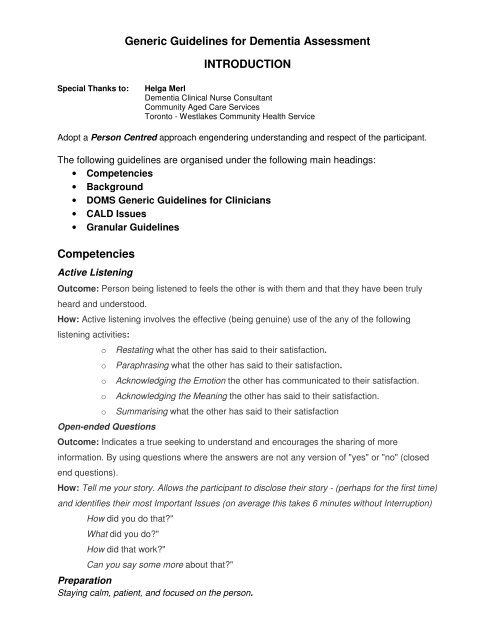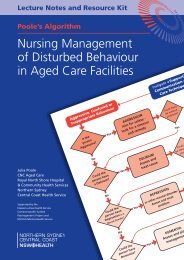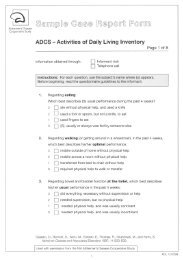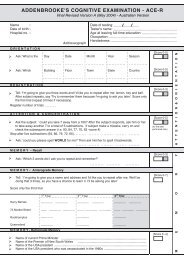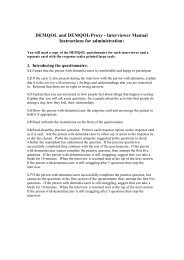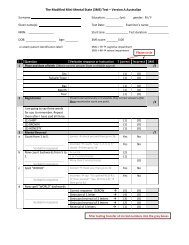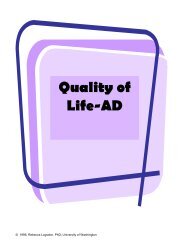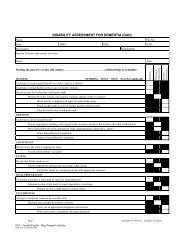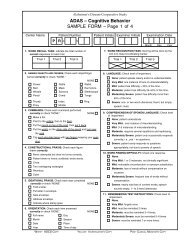Generic Guidelines for Dementia Assessment - Dementia Outcomes ...
Generic Guidelines for Dementia Assessment - Dementia Outcomes ...
Generic Guidelines for Dementia Assessment - Dementia Outcomes ...
Create successful ePaper yourself
Turn your PDF publications into a flip-book with our unique Google optimized e-Paper software.
<strong>Generic</strong> <strong>Guidelines</strong> <strong>for</strong> <strong>Dementia</strong> <strong>Assessment</strong><br />
INTRODUCTION<br />
Special Thanks to: Helga Merl<br />
<strong>Dementia</strong> Clinical Nurse Consultant<br />
Community Aged Care Services<br />
Toronto - Westlakes Community Health Service<br />
Adopt a Person Centred approach engendering understanding and respect of the participant.<br />
The following guidelines are organised under the following main headings:<br />
• Competencies<br />
• Background<br />
• DOMS <strong>Generic</strong> <strong>Guidelines</strong> <strong>for</strong> Clinicians<br />
• CALD Issues<br />
• Granular <strong>Guidelines</strong><br />
Competencies<br />
Active Listening<br />
Outcome: Person being listened to feels the other is with them and that they have been truly<br />
heard and understood.<br />
How: Active listening involves the effective (being genuine) use of the any of the following<br />
listening activities:<br />
o Restating what the other has said to their satisfaction.<br />
o Paraphrasing what the other has said to their satisfaction.<br />
o Acknowledging the Emotion the other has communicated to their satisfaction.<br />
o Acknowledging the Meaning the other has said to their satisfaction.<br />
o Summarising what the other has said to their satisfaction<br />
Open-ended Questions<br />
Outcome: Indicates a true seeking to understand and encourages the sharing of more<br />
in<strong>for</strong>mation. By using questions where the answers are not any version of "yes" or "no" (closed<br />
end questions).<br />
How: Tell me your story. Allows the participant to disclose their story - (perhaps <strong>for</strong> the first time)<br />
and identifies their most Important Issues (on average this takes 6 minutes without Interruption)<br />
How did you do that?"<br />
What did you do?"<br />
How did that work?"<br />
Can you say some more about that?"<br />
Preparation<br />
Staying calm, patient, and focused on the person.
Background<br />
Choosing an assessment tool.<br />
• <strong>Assessment</strong> of older persons is more complicated than that of younger persons, because<br />
there is often more to assess.<br />
• <strong>Assessment</strong> is a means of identifying client characteristics. Translating assessment into<br />
action is still more an art than a science. User training, competence and insight are<br />
necessary (Kane & Kane (2000), Assessing older persons.)<br />
• Health professionals traditionally begin with the measurement tool and work backward.<br />
The more effective way is to know the likely circumstances <strong>for</strong> use of the variety of different<br />
measures.(Kane & Kane, p 3)<br />
Outcome Measures can be classified into two basic groups:<br />
1) <strong>Generic</strong> (across populations)<br />
2) Condition specific (limited clinical context)<br />
DOMS GENERIC GUIDELINES FOR CLINICIANS<br />
Set-up<br />
• Make sure the person has their hearing and/or visual aids on and active.<br />
• Ensure the right person is being assessed by asking, “What is your name?”<br />
• Advise the person that they will be asked some questions and seek permission to ask<br />
these questions, “Would it be all right to ask you some questions about your memory?”<br />
• Seating: Seat yourself so you have easy direct eye contact with the person and select a<br />
seating arrangement that minimises a perception of power or status (e.g. desk), <strong>for</strong><br />
example a round table, corner of a rectangular table, or no table.<br />
Interview<br />
• Ask each question three times if the person does not seem to understand or has not<br />
attempted to answer. If the person attempts to answer and is incorrect, the score is zero<br />
and the rater moves on, giving no verbal clues or prompts.<br />
• If the response is timed, then the rater needs a clock that measures time in seconds.
Admin<br />
• “I am going to ask you some questions and give you some problems to solve, please try<br />
to answer as best you can.<br />
• When asking the person questions, say the questions exactly as they appear in the<br />
scale. If there is an example in the question, this must always be read too. Read aloud<br />
each response option, pointing to each response as you say it.<br />
• Read verbatim the instructions on the front of the questionnaire.<br />
• Raters need to enunciate the words clearly and correctly e.g. people with high-frequency<br />
hearing loss often do not hear the sibilants and have difficulty distinguishing between<br />
them e.g. t and g .<br />
• When the participant has indicated his or her response, mark it on the questionnaire.<br />
Mark only one response <strong>for</strong> each question. If the person does not or cannot answer an<br />
item (<strong>for</strong> any reason), record the response as missing.<br />
Scoring<br />
• Orientation tasks: For example, scoring the date, normally if the person gives the<br />
previous or the next day’s date, then. he/she is awarded the point.<br />
• Serial sevens and spelling a word backwards – Allow the participant to complete five<br />
serial seven responses or complete spelling the word backwards as points are awarded<br />
<strong>for</strong> each time a correct response is elicited regardless of previous incorrect response/s.<br />
Even if the person cannot spell the word <strong>for</strong>ward, they may still get some points <strong>for</strong><br />
spelling the word backward.<br />
Scoring the spelling of “WORLD” backwards is complicated. The detailed<br />
guidelines <strong>for</strong> scoring can be found on this website in the 3MS Manual under<br />
“Cognition”,<br />
• It is better not to have long drawn out sessions, because the person is likely to become<br />
fatigued—affecting per<strong>for</strong>mance.<br />
• Timed sessions:<br />
• (Key outcome—preserve the person’s dignity and prevent catastrophic reactions.)<br />
The rater is to start the timing at the end of the instructions. The person is not made<br />
aware that they are being timed, because this could add a sense of urgency and lead to<br />
rushed answers. There<strong>for</strong>e, the rater times the test inconspicuously and should the<br />
person take longer than the allowed limit, the rater ends the task simply by saying “Thank<br />
you, that’s fine” and proceeds to the next question.<br />
De-briefing after the interview:<br />
• Explain that all the questions have now been answered.<br />
• Ask whether participant has any questions that he or she would like to ask. Answer any<br />
questions and thank the person <strong>for</strong> taking part.
CALD ISSUES<br />
• Use an interpreter when English is the second language and the participant agrees this is<br />
the correct course of action.<br />
• RUDAS is the preferred tool <strong>for</strong> CALD participants<br />
• How to manage the situation, when the rater has English as a second language, as well<br />
as the person being rated (neither share a first language).<br />
• How to manage a situation, which calls <strong>for</strong> an interpreter. How to work with an<br />
interpreter. (can take month(s) to organise an interpreter.<br />
• E.g. Spell world backwards.<br />
Feedback during assessment.<br />
Feedback to ‘patients’ during assessment should be neutral and, usually, should not indicate<br />
whether or not the response was correct.<br />
Appropriate comments as long as the ‘patient’ is trying:<br />
• “That’s fine”<br />
• “You’re doing well”<br />
If the ‘patient specifically asks whether or not they provided the correct response, accurate<br />
feedback can be given.<br />
Encouragement can be given, if the subject is nervous or giving up.<br />
In<strong>for</strong>mant interviews: Accuracy depends on the in<strong>for</strong>mant used. Proxy reports are closer to<br />
personal reports when they provide in<strong>for</strong>mation on usual behaviours as compared with rare or<br />
extreme behaviours.<br />
When using in<strong>for</strong>mants carefully consider potential biases and possible conflicts of interest.<br />
Interview the in<strong>for</strong>mant separate to the person being assessed. Away from the patient.<br />
Assessing individuals who have impaired ability to communicate<br />
(Kane & Kane, p. 486- 489.)<br />
Every attempt should be made to promote participation of the individual in their assessment –<br />
in<strong>for</strong>mant questionnaires are used when additional in<strong>for</strong>mation is required or when the person is<br />
not able to participate meaningfully in the cognitive assessment. Neuropsychological<br />
assessment may also be required to ensure a valid assessment, particularly if capacity is being<br />
questioned.<br />
Time and cost challenge: Because each question may require more time due to potential<br />
impaired cognition, interviews are likely to take longer and result in more fatigue compared with<br />
cognitively intact older adults. Thus, it may be advisable to interview in two or more sessions as<br />
opposed to one long interview, particularly when multiple domains are being assessed. This, of<br />
course, adds to the cost
Granular <strong>Guidelines</strong><br />
More excellent detailed guidelines <strong>for</strong> dementia assessment can be found in Professor S<br />
Banerjee’s DEMQOL Manual found on this site under “Quality of Life Measures”.<br />
Topics include the following:<br />
1. Introducing a questionnaire:<br />
2. Administering questionnaire items:<br />
3. De-briefing after the interview:<br />
4. Possible queries and responses - general:<br />
5. Possible queries and responses – specific:<br />
Professor S Banerjee,<br />
Health Services Research Department,<br />
Institute of Psychiatry, Kings College, London.


